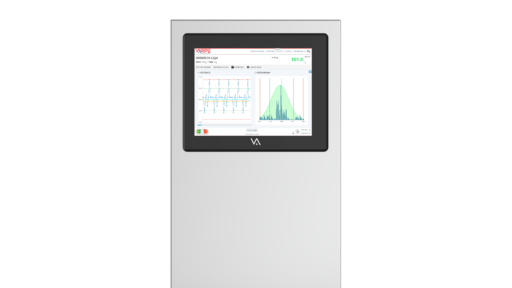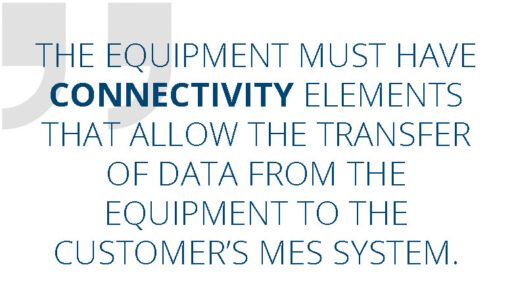Checkweighers are part of the quality control process of most production lines. They are responsible for verifying that the manufactured products are within the tolerances set by the manufacturer and for rejecting any products that are not within the production standard.
WHAT TO VALUE IN A
CHECKWEIGHER?
by marketing on 8 de August de 2023
PRODUCTION WITH WEIGHT CONTROL
WHAT ARE THE BENEFITS?
PRODUCT RENTABILITY AND OPTIMITATION
The greatest of the countless benefits of using industrial checkweighers is the cost-effectiveness that is achieved from the beginning to the end of the manufacturing process. The equipment allows a significant increase in production rate from a low investment cost, bringing permanent advantages to the industry.
WITHOUT STOPS, AUTOMATIC
Checkweighers check the weight of 100% of the products without stopping the production line and automatically separate products that do not comply with tolerance limits.
AVOID UNNECESSARY EXPENSES
Checkweighers help to optimise production, preventing raw material from being wasted through overfilling or packaging that is under-valued and could lead to penalties or damage to the company's image.
HELP TO COMPLY WITH REGULATIONS
These teams are geared to assist with compliance with regulations that apply to manufacturers, such as 21 CFR Part 11 and food safety standards (BRC, IFS, GAP, SQF, ISO, FSCC, etc.).
PRODUCTION DATA UNDER CONTROL
The software incorporated allows all production data to be managed (date, time, line shift, batch, total units, average weight, standard deviation, etc.). In addition, to visualise the evolution of production, they include graphs of the weights recorded individually in real time with respect to the established tolerances. In this way it is possible to see clearly if the production is having a deviation and act accordingly.
EFFECTIVE CONTENT CONTROL AND METROLOGY
In addition, to help with the control of the actual content of packaged products, they have the option to work under EEC regulations, where the concepts of tolerance and quantity of accepted packages are automatically taken into account.
In addition, many checkweighers have metrological confirmation in accordance with the European Metrology Directive.
In addition, many checkweighers have metrological confirmation in accordance with the European Metrology Directive.
WHAT SHOULD WE TAKE INTO ACCOUNT?
LONG TERM SUPPLIER
We must choose a consolidated supplier with experience in the sector in which we work, who can accompany us throughout the whole process, not only during the purchase of the equipment, but also throughout the life cycle of the checkweigher.
It is important that they can also support us in carrying out periodic metrological checks and repairs, as well as calibrations.
It is important that they can also support us in carrying out periodic metrological checks and repairs, as well as calibrations.
VERSATILITY
It is important to bear in mind that the equipment should be adaptable, in the event that changes in functionality or structure are required in the future. For this reason, it is recommended to choose checkweighers with a modular design, which allows some parts or modules to be replaced by others without too many complications.
Varpe performs customised calibrations at the customer's request depending on the weights of the desired formats and the speed at which each weight must be calibrated. At the end of the calibration, an ENAC calibration certificate will be issued with the results obtained.
DURABILITY
Similarly, if we choose equipment with good materials and modular design, the intention is that its life cycle will be long. Therefore, we should choose a robust and quality design that allows us to use the checkweigher for as long as possible.
ADAPTATION
We must have suppliers who can adapt the checkweighing equipment according to the needs of the customer and the sector. Varpe has an R&D and engineering team that will study each case to find the optimum solution for each production line. In this way, each project is studied until the most effective solution is found.
PRECISION, EFFICIENCY AND SPEED
It is important to take into account the characteristics of the production and the product to be controlled, as we will have to select a checkweigher according to the precision requirements.
At the same time, we will have to consider the product throughput speed in order to choose equipment that can work at the required rate.
All this, always bearing in mind the efficiency of production and without the need to oversize the features and avoid unnecessary costs.
At the same time, we will have to consider the product throughput speed in order to choose equipment that can work at the required rate.
All this, always bearing in mind the efficiency of production and without the need to oversize the features and avoid unnecessary costs.
MANTENANCE
Checkweighing equipment should be easy to maintain, with parts that are easy to change and clean. In addition, possible vibrations of the line must be monitored and acted upon. A supplier capable of providing support in this regard should be selected.
INTUITIVE SOFTWARE
Equally as important as the mechanical and electrical parts is the software technology of the checkweigher. The program should be as intuitive as possible so that operators can use it easily and minimise errors.
EASY TO DISMANTLE AND CLEAN
It is highly recommended that the textile belts of conveyor belts are adapted according to FDA standards. In addition, it is preferable that they have a quick disassembly system to facilitate the removal and cleaning of the belt.
It is also advisable that the bearings are protected to avoid the accumulation of debris and to ensure that they do not lose their lubrication.
It is also advisable that the bearings are protected to avoid the accumulation of debris and to ensure that they do not lose their lubrication.

Varpe has hygienically designed equipment that includes all the mechanical, electrical and software elements that will allow you to have a checkweigher with high durability and quality.
Consult with your manager for your customised equipment.
Consult with your manager for your customised equipment.
CONNECTIVITY
Moreover, in an environment where Industry 4.0 is becoming more and more important, we should opt for equipment that is easily connected to an MES system.

These may be Ethernet connections with MODBUS or OPC-UA and embedded USB, for example.
